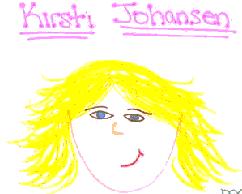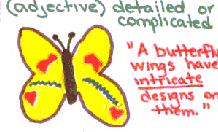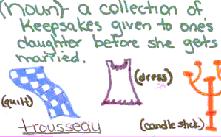Number
the Stars by Lois Lowry
Section One
Plan- Chapters 1-4
Morgan Vassey
Discussion Director
Your job is to
think of questions that will get your group thinking. Ask the following
types of questions, answer them, and include the page and paragraph numbers
where the answer can be found.
1 MCEOG
1 Cause and Effect
2 Predictions
1 Opinion
Character Sketcher
Your job is to
complete the role sheet for Kirsti, Annemarie, or Ellen.
Word Wizard
Your job is to
complete the role sheet for the following words:
Intricate
p. 14, par. 9
Awed
p. 33, line 3
Trousseau
p. 14, par. 9
Haughtily
p. 19, par. 6
Passage Picker
1 Thematic
1 Figurative
Language (simile)
2 Foreshadowing
Summarizer
Your job is to
prepare a brief summary of today’s reading, Chapters 1-4. Make sure
to include all the main ideas and important events.
Number the
Stars by Lois Lowry
Section 1,
Chapters 1-4
Morgan Vassey
Discussion
Director
Q: After
reading the first section, who do you think the girl on the cover is?
Why?
A: Annemarie
Johansen. She is the main character and is described as having
blond hair (p. 1, par. 5).
Q: What
do you think the necklace on the cover is, and what does it symbolize?
A: It is
the Star of David, which is an important symbol in the Jewish religion.
The
story is about a girl’s experience helping her Jewish friend find freedom
from the
Nazis, so it probably symbolizes the struggles the Jews go through during
that
time.
Q: Why do
you think the author included the parts about the fairy tales in the story?
A: Kirsti
is very young and innocent. She doesn’t understand what is going
on, and
has been sheltered from the truth about the Nazis. To her, life is
like normal
because she doesn’t remember anything before the Nazi occupation of Denmark.
I think the fairy tales symbolize her innocence and add to her developing
character. I also think that it is a reminder of how different life
is for them. As
stated in the book, everything has changed but the fairy tales remain the
same (p.
17, par. 4). I think it gives the girls, especially Kirsti, something
to hold on to. It
gives them hope.
Q: Why did
Denmark’s king burn his Navy when he heard the Germans were
coming?
a. The ships were old and no good.
b. The king decided the Army would be better.
c. The king would
rather burn his ships, than risk his people’s lives.
d. It was a cold winter, and the town needed heat.
A: C. The king knew that his Navy was much too small to defeat
the Germans, and
many Danes would likely die. (p.15, par. 2).
Q: Why is Ellen staying the night at Annemarie’s apartment?
A: Because the Nazis got a list of all the Jews, and will probably
come to Ellen’s
apartment to “relocate” her family. Ellen’s parents have left in
secret, with Peter’s
help. Ellen is going to pose as Annemarie’s sister if soldiers come
to the
apartment. Since Annemarie’s family is not Jewish, they should not
be at risk,
unless their plan to hide Ellen is found out.
Number the
Stars by Lois Lowry
Section 1,
Chapters 1-4
Morgan Vassey
Character
Sketcher

Character Trait:
Bold
p.4, par. 11-12
Two German soldiers
stop Annemarie, Ellen, and Kirsti on the corner. Annemarie and Ellen
are nervous and a bit scared to talk to them. They are on their best
behavior. One soldier tells Kirsti that she looks like his daughter,
and he touches her hair. She yells, “Don’t!” and the soldier just
laughs. She was very bold and brave to say something to that soldier.
Innocent
p.35, line 5
The night
Ellen stays over at the Johansen’s apartment, as they all sat around the
dinner table, the mood was tense. Annemarie and Ellen were scared
about what was happening to Ellen’s parents, and Annemarie’s parents were
worried as well. Kirsti, however, had no idea what was going on and
was preoccupied with the fairy tale her mother promised to tell her at
bedtime. She has no idea of the dangerous situation her family has
put themselves in.
Easily amused
p. 34, par. 3-7
Annemarie’s
parents tell the girls that Ellen will be staying the night with them and
that Ellen and Annemarie will sleep in the same room, while Kirsti will
sleep with her parents in their room. Kirsti was about to put up
a fight, but her mother tells her that she will tell her a story before
bedtime. Kirsti asks if it will be one about a king, and her mother
agrees. Kirsti insists that there be a queen, too. When her
mother agrees, Kirsti is satisfied.
Character Goal:
Kirsti’s goal
is probably to be included in what her sister, Annemarie, and Ellen do.
She is very young, and doesn’t really know what is going on with the war.
She lives for the moment, and is only concerned with what is going on at
that specific time.
Problem:
Kirsti’s problem
is that she wants to be a part of the action. She wants to be let
in on the secrets, but she is just too young to understand. Her parents
want to protect her from the horrible outside world, but little does she
know that she is already involved.
Solution:
Even though she
may not know that she is helping out, Kirsti may be passively involved
in protecting Ellen’s family, the Rosens, by just being herself.
The less she knows, the less likely she will give something away.
Her innocence may save them.
Number the
Stars by Lois Lowry
Section 1,
Chapters 1-4
Morgan Vassey
Passage Picker
Passage One
1. p. 24, par.
5
2. “Friends will…friends
do.”
3. Thematic
4. It is thematic
because one moral to this story is that friends should help each other
out, no matter what kind of situation they are in. Friends are there
no matter what.
5. In what way
do you think the Johansens will help their friends, the Rosens, find safety
from the German soldiers?
- I think they
will help them escape Copenhagen in the middle of the night. They
might hide them out at Uncle Henrik’s house, or try to get them to another
country that has not been taken over by the Germans.
6. I think Lois
Lowry included this because it is the main theme of the story. The
Johansens risk their lives to help the Rosens, because that’s just what
friends do. Friends help friends.
Passage Two
1. p. 5, par.
7
2. “For Kirsti…
remembered life.”
3. Figurative
Language- simile
4. It is an example
of figurative language (simile) because the soldiers are compared to lampposts.
They are like lampposts because they have been in Copenhagen so long that
they blend in with the scenery just as lampposts do.
5. How do you
think the soldiers’ presence in Copenhagen has effected Annemarie, Ellen,
and Kirsti’s lives?
- Annemarie
and Ellen are old enough to remember life before the soldiers, so they
reminisce about things they used to do and have before the war. Kirsti,
on the other hand, is too young to remember life before the soldiers, but
she does remember little things they used to have, like cupcakes.
As Annemarie brings to the reader’s attention, Kirsti can’t possibly remember
these things, because she was just a baby when cupcakes and other like
foods were available. She probably remembers them through stories
that other people tell, and therefore, believes that she remembers them
from her own experiences.
6. I think Lowry
included this to help the reader understand the mood of the city.
She wanted the reader to know that the soldiers in the streets were part
of everyday life for the people of Copenhagen, and had been for a few years.
Though they didn’t like them being there, they had grown accustomed to
their presence and had come to grips with how life would be until the war
ended.
Passage Three
1. p. 22, par.
7
2. “Though his
visits… to see Peter.”
3. Foreshadowing
4. I think it
is foreshadowing because I believe that Peter may have had a hand in helping
the Rosens leave town. It’s just a suspicion, but because he and
Annemarie’s sister Lise are brought up a lot, there seems to be something
more to the story.
5. Why do you
think Peter defies curfew and visits at night?
- I think
he is part of helping the Rosens leave town, and therefore, could not risk
visiting during the day. He’s trying to go unnoticed by the soldiers.
6. I think this
passage is important because it develops Peter’s character a little more.
The reader begins to see his compassion, and knows that he must be a caring
person.
Passage Four
1. p. 25, par.
4-7
2. “She turned…
Papa replied.”
3. Foreshadowing
4. I think this
passage is foreshadowing because I believe the Johansen family will become
“bodyguards” for their Jewish friends, and will go the extra mile to protect
them.
5. If you lived
during this time and had Jewish friends, would you help them escape “relocation”
even though you would be risking your life? Why or why not?
- I would
because I believe that you have to stand up for what is right. The
Jewish people were being discriminated against, some to their death.
I would be scared, but I would not be able to live with myself if I didn’t
help them survive.
6. I think Lowry
included this passage to reassure the reader that the Johansens would not
just sit by and let their friends and neighbors be “relocated.” It
gives the reader a bit of hope that something will be done to save the
Jews.
Number the
Stars by Lois Lowry
Section 1,
Chapters 1-4
Morgan Vassey
Summarizer
Annemarie
Johansen lives in Denmark during WWII. She lives with her parents
and her younger sister, Kirsti. Her older sister, Lise, was killed
in a car accident. Annemarie’s best friend is a Jewish
girl named Ellen. It is 1943 and German soldiers occupy the streets of
Copenhagen. King Christian, the king of Denmark, burned their Navy
when he heard of the coming Germans, because he knew that Denmark was much
too small to take on such a large opponent; too many lives would have been
lost. Since the Nazi occupation, the country has been stricken by
food shortages and curfews. The Nazi soldiers get a list of all of
the Jewish families in Copenhagen from the local synagogue. Annemarie’s
family decides to hide Ellen out in their house, pretending that she is
one of their children, while Ellen’s parents flee to another hiding place.
The only problem is that Ellen has dark hair and Annemarie and Kirsti have
blond hair.
Number the
Stars by Lois Lowry
Section 1,
Chapters 1-4
Morgan Vassey
Word Wizard
Word One
1. Intricate,
p. 14, par. 9
2. Her fingers
moved rapidly, turning the thin white thread into an intricate narrow border.
3. Adjective-
detailed, complicated
4. Something
that has complex and contains many details.
5. This word
was used when Annemarie was thinking about a pillowcase that her mother
made for her sister’s trousseau. It was a fond memory of how life
used to be when her sister Lise was alive. She was remembering how
much her parents loved Lise, and how devastating her sudden death had been.
It adds emotion to an already emotional story of friendship and family.
6. (See Word
Card)

Word Two
1. Awed, p. 33,
line 3
2. Annemarie
always stood very quietly, awed, to watch; even Kiristi, usually a chatterbox,
was always still at that time.
3. Adjective-
overwhelmed, impressed
4. To be in amazement
of something or someone
5. It is important
to the story because it shows reverence for the Jewish New Year ceremony.
Even though Annemarie and Kirsti were not Jewish, they were still respectful
and interested in their friend’s religious traditions.
Word Three
1. Trousseau,
p. 14, par. 9
2. Momma had
been crocheting that night, three years ago: the lacy edging of a
pillowcase, part of Lise’s trousseau.
3. Noun- a collection
of keepsakes to send with one’s daughter when she gets married
4. Various keepsakes,
either handed down or new, parents collect over the years to give their
daughter when she gets married.
5. This is important
to the story because Lise and Peter were engaged to be married when Lise
was killed in the car accident. Her death was devastatingly unexpected,
and this is illuminated by the fact that her mother was continually making
things to go into her trousseau.
6. (See Word
Card)

Word Four
1. Haughtily,
p. 19, par. 6
2. “I did not!”
Kirsti said haughtily from the bedroom doorway.
3. Adverb- conceitedly
4. To do something
in a manner that portrays an attitude of being proud
5. This word
lends more to the development of Kirsti’s character. She is a very
innocent, naïve, yet bold little girl that wants to be in the center
of attention all of the time.